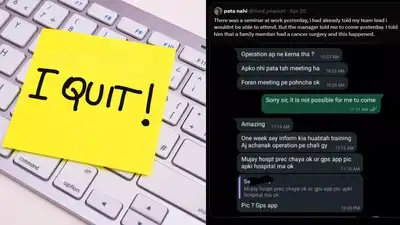In a situation that has ignited widespread debate online about employee privacy and workplace ethics, a woman resigned from her job after her boss allegedly demanded her real-time GPS location and photographs from a hospital while she was handling a family emergency.
The employee, who chose to remain anonymous, said she had urgently informed her employer about the medical crisis. Rather than offering support, her supervisor insisted she provide proof that she was indeed at the hospital. According to her account, the manager requested live location tracking and asked her to send pictures from inside the medical facility.
“I was already stressed and scared about my family member,” the woman shared in an online post. “Being asked to prove I was telling the truth just shattered any remaining trust I had in my employer.”
Unable to tolerate the lack of compassion and what she called “a complete invasion of privacy,” the woman decided to quit her job immediately.
Outrage Over Workplace Surveillance
This incident has drawn sharp criticism on social media platforms, with many users condemning the employer’s demands as extreme and inappropriate. Conversations are growing louder about the fine line between legitimate accountability and invasive micromanagement.

Workplace rights advocates emphasize that while employers may set attendance policies, requiring personal GPS tracking or hospital images crosses ethical and sometimes legal boundaries.
“In emergencies, employees deserve empathy, not surveillance,” said a labor law expert commenting on the situation. “A culture of mistrust drives away good workers and damages a company’s reputation.”
Not an Isolated Case
Unfortunately, stories like this are not rare. In a similar 2015 case in California, an employee was fired after uninstalling a GPS tracking app from her work phone during non-working hours. She later sued her company for invasion of privacy (CNN Business).
The rise of remote work and digital monitoring tools has only intensified the conversation around privacy rights at work. According to experts, while some monitoring is legally permissible, forcing employees to surrender real-time personal data, especially during personal crises, is unethical and often unnecessary.
Employee Privacy vs Employer Control
Legal analysts suggest that companies can and should have clear policies regarding time off and emergency leave but must balance these rules with respect for employee dignity.
“Employers must trust their staff during crises,” said an HR consultant. “Demanding proof like GPS or photos in sensitive situations shows poor leadership and can lead to legal and reputational risks.”
In the wake of the backlash, many online users are urging workers to know their rights, suggesting that extreme demands for proof could be a violation of labor and privacy laws, depending on the jurisdiction.
A Growing Trend of Worker Empowerment
This case highlights a larger trend: employees are increasingly unwilling to tolerate toxic workplace environments. With the rise of remote work, greater awareness of labor rights, and public forums to share experiences, workers today have more platforms and options to challenge unfair treatment.
As the debate around workplace surveillance and employee dignity continues, experts recommend that companies revise their policies to be more humane and reasonable — or risk losing talented employees for good.